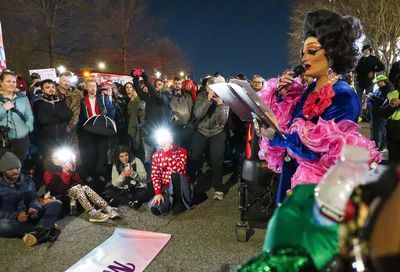Iowa’s “Don’t Say Gay” Law Blocked by Federal Judge
A federal judge has blocked an Iowa law barring LGBTQ discussions or content in schools, leading to several LGBTQ books being banned.

A federal court temporarily blocked a law prohibiting LGBTQ-related discussions or curriculum content in schools and banning books with descriptions of a sex act from school libraries, including those at the high school level — except for religious texts such as the Bible.
U.S. District Court Judge Stephen Locher of the Southern District of Iowa granted a preliminary injunction that prohibits state authorities from enforcing the law, also known as the “Don’t Say Gay” law, which was slated to go into effect on January 1, 2024.
Had the law gone into effect, administrators, teachers, librarians, and school staff could have been subjected to disciplinary action, including termination or the loss of their teaching license, for broaching LGBTQ content, failing to remove books from classrooms and school library shelves, or not informing parents when their children identify as transgender or ask to use pronouns that don’t match their assigned sex at birth.
Since the law’s passage, critics, including the plaintiffs in the lawsuits, have noted that multiple Iowa school districts have pulled hundreds of books from library shelves out of fear that the books may run afoul of the law’s provisions.
For example, the Urbandale Community School District initially flagged 374 books for removal from shelves for possible violations, eventually reducing that number to 64.
Similarly, the Norwalk Community School District also issued a list of 64 books for removal. Mason City banned 20 books from its schools, using artificial intelligence to help determine which ones should be banned — resulting in some classic novels, like The Handmaid’s Tale and Beloved, being banned.
Republican Gov. Kim Reynolds and other proponents of the “Don’t Say Gay” law have claimed it is intended to protect children from “pornography” and works containing “sexually explicit content.” But many of the banned books contain LGBTQ content, including LGBTQ characters, historical figures, or themes, which critics argue blocks LGBTQ students from reading about characters with whom they identify and from taking solace in the idea that they are not alone.
The law was challenged by a group of seven families, with eight students affected by the law, and the pro-LGBTQ group Iowa Safe Schools. The plaintiffs have argued that the measure violates students’ First Amendment right to receive information, deprives them of the right to free speech and expression, and their right to expressive association.
The lawsuit also argues the “Don’t Say Gay” law is overly broad and vague regarding which content is prohibited, despite the Iowa Board of Education’s issuance of proposed rules on how the law should be implemented.
The suit also alleges the law is discriminatory against LGBTQ students, and violates the Equal Access Act by prohibiting Gender and Sexuality Alliances (GSAs) from participating in group discussions or advertising meetings, threatening to “out” members to their parents under a parental notification provision in the law, and banning them altogether at schools where pupils who are in or below the sixth grade are part of the student body.
The plaintiffs demanded a temporary injunction blocking the law from being enforced while the law is challenged, and have also asked the court to declare the law unconstitutional and permanently block enforcement of it.
A second lawsuit, brought by a student, several teachers, the Iowa State Education Association, four authors, and publishing giant Penguin Random House, claims that the book ban provision is overly broad, encompassing any description or depiction of sex, regardless of the context in which it appears, whether the work is fiction or nonfiction, and even in cases where the sex-related descriptions are unrelated to the overall plot of the book.
That lawsuit also argues that the ban on references to sexual orientation and gender identity are discriminatory under the Fourteenth Amendment’s equal protection clause.
After hearing arguments in the Iowa Safe Schools challenge, Locher sided with the plaintiffs, finding that the law unfairly deems all books that depict sex, except religious texts, as having no educational or literary value, as reported by MSNBC.
“The underlying message is that there is no redeeming value to any such book even if it is a work of history, self-help guide, award-winning novel, or other piece of serious literature,” he wrote. “In effect, the Legislature has imposed a puritanical ‘pall of orthodoxy’ over school libraries.”
Locher added that the defendants, including Iowa state officials, have not presented evidence that the books targeted by the ban have caused such “significant problems” to justify their removal from schools. Additionally, because the language banning discussions and curriculum content dealing with gender identity and sexual orientation is neutral and makes no distinction between cisgender and transgender identities or gay and straight relationships, the law effectively forbids instruction recognizing any gender identity or relationship, Locher wrote.
“The statute is therefore content-neutral but so wildly overbroad that every school district and elementary school teacher in the State has likely been violating it since the day the school year started,” he wrote.
Teachers would be barred from identifying historical figures or literary characters by their gender or from referring to anyone by male or female pronouns, since doing so would amount to a violation of the law, Locher said.
Locher subsequently issued a preliminary injunction blocking the portions of the law relating to curriculum restrictions on LGBTQ content and the book ban, finding that they likely infringe on free speech and are vague and overbroad, meaning they are unconstitutional.
However, he allowed the provisions of the law requiring teachers to inform parents of students’ gender identities to take effect, on the grounds that none of the plaintiffs — who are already “out” to their parents — had standing to challenge that section of the law.
“We are glad our clients, Iowa families and students, will be able to continue the school year free from the harms caused by these parts of this unconstitutional law,” Nathan Maxwell, a senior attorney for Lambda Legal, said in a statement. “This decision sends a strong message to the state that efforts to ban books based on LGBTQ+ content, or target speech that sends a message of inclusion to Iowa LGBTQ+ students cannot stand.”
Support Metro Weekly’s Journalism
These are challenging times for news organizations. And yet it’s crucial we stay active and provide vital resources and information to both our local readers and the world. So won’t you please take a moment and consider supporting Metro Weekly with a membership? For as little as $5 a month, you can help ensure Metro Weekly magazine and MetroWeekly.com remain free, viable resources as we provide the best, most diverse, culturally-resonant LGBTQ coverage in both the D.C. region and around the world. Memberships come with exclusive perks and discounts, your own personal digital delivery of each week’s magazine (and an archive), access to our Member's Lounge when it launches this fall, and exclusive members-only items like Metro Weekly Membership Mugs and Tote Bags! Check out all our membership levels here and please join us today!

























You must be logged in to post a comment.